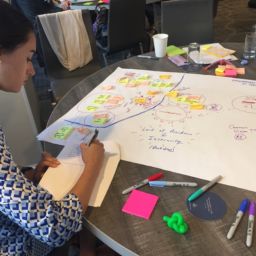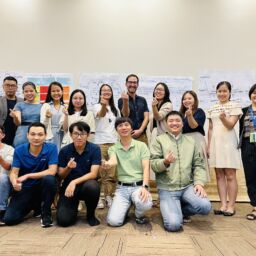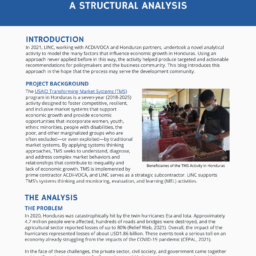As a champion of collaboration in international development, LINC recognizes the importance of and encourages knowledge sharing among development stakeholders, as well as the adaptation of best practices to specific contexts. It is a practice that LINC actively incorporates in its work. Most recently, LINC facilitated a knowledge sharing activity between two of its programs from different countries in Latin America to strengthen capacity and learn from tested practices. This type of initiative not only expands expertise but also fosters a culture of learning and capacity building for the benefit of stakeholders of development projects.
Evidence indicates that collaborating, learning, and adapting (CLA) contributes to improved organizational and development outcomes. -USAID
The five-year USAID/Mexico Monitoring and Evaluation Support for Adaptation (MESA) Activity was asked to facilitate the launch four communities of practice (CoPrs) to support the programming of USAID/Mexico implementing partners (IPs). The CoPrs focus around four cross cutting priority themes: (1) Integrating Gender into Activities; (2) Private Sector Engagement; (3) Local Capacity Strengthening; and (4) Adaptive Management.
As the development of the CoPrs is still in early stages, MESA’s support includes planning and facilitating community meetings and coordinating featured speakers, with the goal of creating four self-managed, sustainable CoPrs. To date, 49 individuals from 27 IPs and the USAID/Mexico Mission have attended meetings of at least one of the communities.
In this context, and aware of the success of the USAID/Honduras Transforming Market Systems (TMS) Activity in promoting locally led development and the localization agenda, and for which LINC is a subcontractor to prime contractor ACDI/VOCA, LINC’s HQ technical team identified the opportunity to invite the TMS team to share lessons learned in their promotion of locally led development with the newly forming CoPrs.
During a recent meeting of the MESA-hosted Local Capacity Strengthening CoPr, LINC’s national staff from the Honduras TMS Activity shared the best practices for effective partnerships with local actors, which are:
- Co-creation: Meet with key stakeholders in the local system to create a shared vision and to exchange ideas.
The TMS Activity
The TMS Activity, implemented by ACDI/VOCA (prime contractor) and LINC (subcontractor), seeks to understand, diagnose, and address complex market behaviors and relationships that contribute to inequality and lack of economic growth, with the goal of developing market systems that are more competitive, resilient, and inclusive. As of now, TMS has achieved more than 35% of Activity funding accessed by 78 local organizations (higher than USAID’s target for localization of 25% of funding going to local organizations).
TMS promotes local leadership via four main avenues: (1) transfer of power to local partners who serve as drivers of change; (2) adoption of practices that allow for locally led change; (3) direct assistance and accountability for results; and (4) recognition and strengthening of the capacities of partners within the system.
2. Openness: Maintain flexibility in programming by reducing restrictions, increasing diversity, remaining open to new ideas, and adapting throughout program implementation.
3. Healthy Partnerships: Prioritize the health of your relationships with partners to ensure shared expectations, open communication, and mutual benefit.
4. Networking: Strengthen local networks and foster strategic relationships to improve technical assistance and facilitate sustainable systems change.
In preparation for the knowledge sharing exercise, TMS provided inputs for the presentation, the LINC HQ team streamlined the information and adjusted it to the mission of the CoPr and the Mexican context, and both teams worked together to identify who would be the most appropriate person to effectively communicate TMS’s work to the Mexican audience.

Through near constant communication leading up to the CoPr meeting, the collaboration was able to successfully represent TMS’s work and their best practices on localization, and USAID/Mexico implementing partners heard from a primary source what is working towards localization efforts.
I really liked the presentation about local capacity strengthening from one of USAID implementing partners in Honduras. It’s inspiring to learn how other local partners genuinely want to work together and collaborate. It’s a win-win situation. -Participant at the CoPr
This collaboration between MESA and TMS provided a meaningful opportunity for knowledge sharing across USAID-funded activities and between LINC HQ staff and LINC staff from our Mexico and Honduras project offices. These efforts, along with prior cross-activity collaborations between LINC worldwide staff, have proven to be valuable both for LINC and our project stakeholders as it has expanded the expertise available to support internal and external capacity building and to share best practices from around the world.
This blog was authored by Allie Gamble and Stephanie Lacouture.



